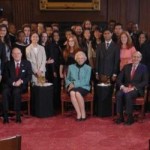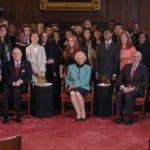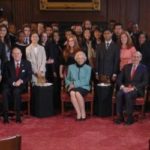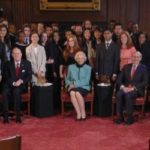How do educators invest in productive, deep, and transformative dialogue in their classrooms? Civic Conversations is a collaboration between the Edward M. Kennedy Institute’s civic education programming and the community-building dialogic structure practiced by Essential Partners. Explore resources, activities, and lesson structures that support educators as they facilitate difficult conversations, create inclusive learning environments, raise complex discussions, and promote a safe space for students to consider their values and engage in their communities. Policy simulations at the Kennedy Institute reflect the wide range of issues that face our country today. Students debate the best way to reform our immigration system, consider the balance between privacy and security, and think about how to meet the challenge of climate change. As in the real Senate, it’s natural that students will disagree on the best approach to many civic issues. This collection of resources will support educators as they prepare to discuss civic issues, either in preparation for a Kennedy Institute field trip or to practice listening, sharing, and learning in the classroom.
Civic Conversations
How do educators invest in productive, deep, and transformative dialogue in their classrooms? Civic Conversations is a collaboration between the Kennedy Institute’s civic education programming and the community-building dialogic structure practiced by Essential Partners. Explore resources, activities, and lesson structures that support educators as they facilitate difficult conversations, create inclusive learning environments, raise complex discussions, and promote a safe space for students to consider their values and engage in their communities.
Pathways to Environmental Justice
In this one-hour virtual field trip hosted and led by Edward M. Kennedy Institute education staff, students in grades 4 through 8 learn about the challenges posed by climate change and the need to transition to a more sustainable and resilient economy. They will work together as Senators to build a bill that provides assistance and environmental justice for three distinct groups of people affected by climate change: frontline and vulnerable communities, fossil fuel workers, and young people. Register here.
Cold War Document Based Question
Utilizing primary source documents from the archives of Presidents Truman, Eisenhower, Kennedy, Nixon, and Reagan, this piece of curriculum is modeled after the Advanced Placement Document Based Questions. This question invites students to explore U.S. Cold War foreign policy through the lens the office of the presidency, and to develop crucial critical thinking and writing skills.
Freedom of Speech
In this lesson, students analyze a photo of Robert Kennedy speaking outside the U.S. Department of Justice on June 14, 1963, and use it to discuss freedom of speech as a constitutional right in the United States, and human rights around the world.
The 19th Amendment: A Woman’s Right to Vote
Voting is the most basic right of a citizen and the most important right in a democracy. When you vote, you are choosing the people who will make the laws. For almost a century and a half of our nation’s history, women were barred from exercising this fundamental right. This film explores the long, difficult struggle for women to win the right to vote. It’s about citizenship, the power of the vote, and why women had to change the Constitution with the 19th Amendment. The film includes primary sources and commentary from historians, legal scholars, and Justices Ruth Bader Ginsburg and Anthony Kennedy.
A Conversation on Judicial Independence

Justices Stephen G. Breyer, Anthony M. Kennedy and Sandra Day O’Connor and high school students discuss why an independent judiciary is necessary and how Article III, Section1, in the Constitution safeguards the role of judges. This video complements the documentary An Independent Judiciary: Cherokee Nation v. Georgia and Cooper v. Aaron.
A Conversation on the Importance of the Japanese Internment Cases

Justices Stephen G. Breyer, Sandra Day O’Connor and Anthony M. Kennedy discuss two landmark cases, Korematsu v. U.S. and Hirabayashi v. U.S., in which the Supreme Court tried to strike a balance between individual rights and national security during wartime. The cases stem from President Franklin Roosevelt’s 1942 executive order that mandated the relocation of Japanese and Japanese Americans to internment camps. This video complements the documentary Korematsu and Civil Liberties.
A Conversation on Freedom of Speech

Justices Stephen G. Breyer, Anthony M. Kennedy and Sandra Day O’Connor and students discuss the First Amendment’s right to free speech, and in particular students’ free speech rights in the Supreme Court cases Tinker v. Des Moines Independent Community School District and Morse v. Frederick. In the Tinker case, students wore black armbands to school in silent protest of the Vietnam War. In the Morse case, a student held up a sign that said “Bong HITS 4 Jesus” at a parade.
